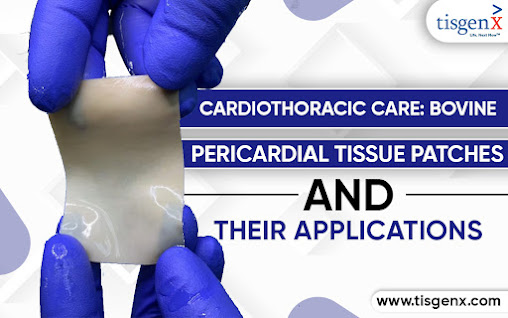Cardiothoracic Care: Bovine Pericardial Tissue Patches and Their Applications
When it comes to matters of the heart, precision and innovation in medical procedures are of paramount importance. In the realm of cardiothoracic surgery, one such innovation that has been making waves is the use of a bovine pericardium patch. These patches have emerged as vital tools in repairing and enhancing cardiac structures.
Let's take a closer look at these remarkable advancements in cardiovascular care.
Understanding Bovine Pericardial Tissue Patches
Before we jump into their applications, let's understand what Bovine Pericardial Tissue Patches are. The thin, durable, double-layered sac known as the pericardium surrounds and protects the heart. Due to its remarkable durability and compatibility with the human body, it has found its way into the operating rooms of cardiothoracic surgeons worldwide.
Applications in Cardiothoracic Surgery
The heart of the matter: where do Bovine Pericardial Tissue Patches find their most valuable applications in cardiothoracic care?
Valve Repairs and Replacements: When heart valves malfunction, it's crucial to repair or replace them promptly. Bovine pericardial patches are commonly used for this purpose. They can restore valve function and extend the life of the valve replacement.
Atrial Septal Defect (ASD) Closure: ASDs are congenital heart defects where there's a hole in the wall (septum) separating the heart's upper chambers. Bovine pericardial patches are used to close these holes, preventing complications and improving heart function.
Vascular Surgery: Beyond the heart, these patches also find utility in vascular surgery. They can be used to repair damaged blood vessels, ensuring proper blood flow throughout the body.
Choosing the Right Path for Cardiothoracic Care
As the field of cardiothoracic care continues to evolve, patients and medical professionals are presented with an array of options. When considering the use of Bovine Pericardial Tissue Patches for cardiovascular procedures, it's vital to collaborate closely with a skilled and experienced cardiac surgeon. Here are some key considerations:
Individualized Treatment Plans: Every patient is unique, and their cardiac conditions vary. A knowledgeable cardiac surgeon will assess the patient's specific needs and recommend the most appropriate treatment plan, which may or may not involve Bovine Pericardial Tissue Patches.
Risk Assessment: The surgical team will evaluate the patient's overall health and discuss potential risks and benefits associated with the use of these patches. Open and honest communication between the medical team and the patient is crucial for informed decision-making.
Post-Operative Care: After cardiac surgery involving these patches, diligent post-operative care and follow-up appointments are essential. Patients should be aware of the steps they need to take for a smooth recovery and long-term heart health.
Alternatives: While Bovine Pericardial Tissue Patches offer many advantages, there may be situations where alternative materials or procedures are more suitable. Trust your healthcare team's expertise in making these decisions.
A Bright Future for Cardiothoracic Care
The utilization of Bovine Pericardial Tissue Patches in cardiothoracic surgery signifies a promising future for patients in need of heart and vascular procedures. So, the field of cardio care is continually advancing, and innovations like the Bovine Pericardial Tissue Patch for Cardiothoracic Surgery are transforming the way we approach heart surgery.
These patches offer a lifeline to patients with cardiac issues, promising improved heart function, reduced complications, and an enhanced quality of life. As we move forward in the pursuit of healthier hearts, the contributions of such innovations cannot be overstated, providing hope and healing to those who need it most.




Comments
Post a Comment